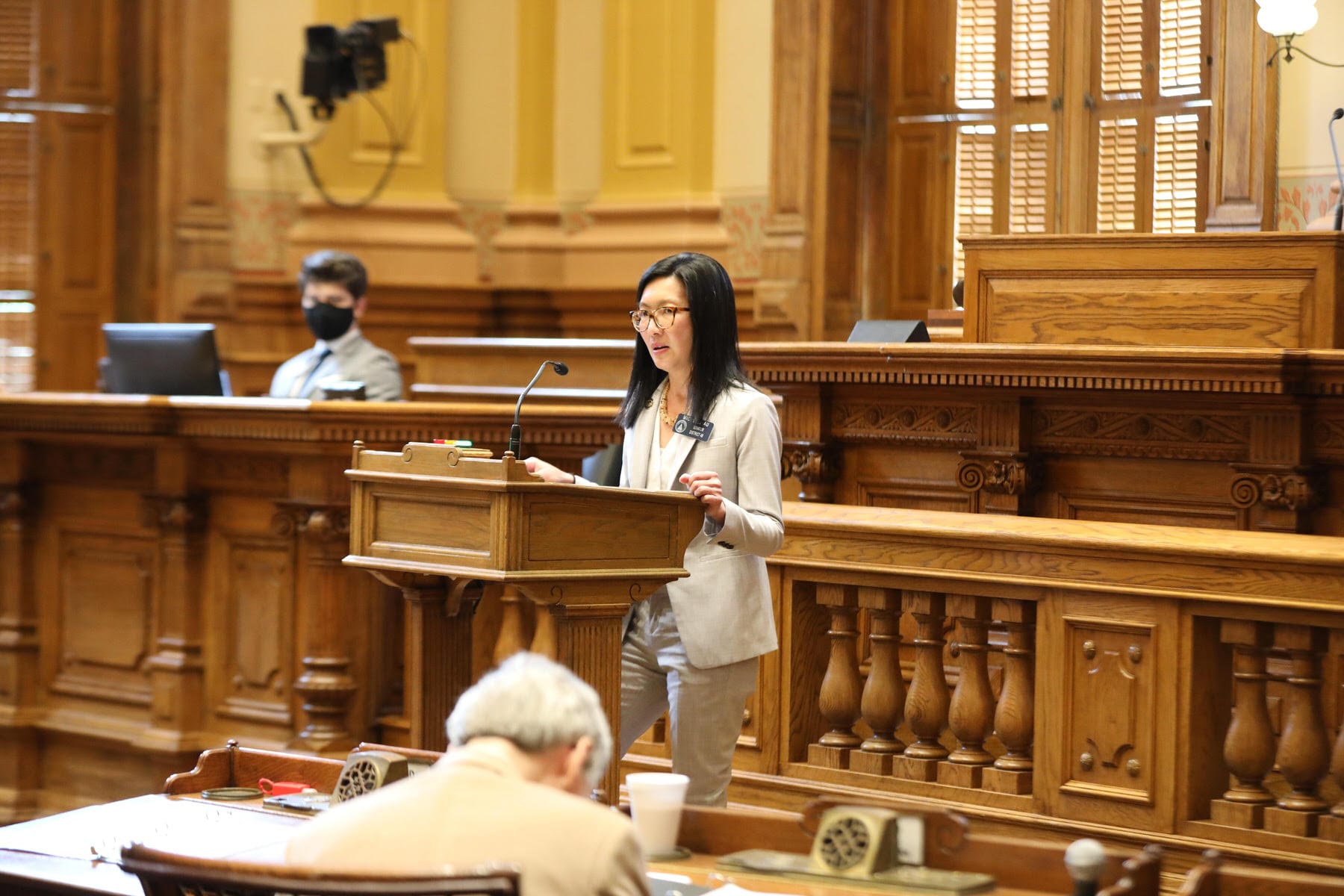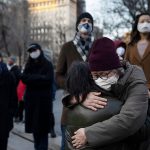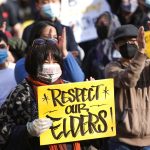The day before a gunman killed eight people, including six Asian women, in a trio of shootings across metro Atlanta, Michelle Au stood in front of the Georgia Senate to address the ongoing violence against Asian Americans, recently exacerbated by racist responses to the coronavirus pandemic.
“Asian Americans are part of our country’s plurality,” said Au, currently in her first term in the Georgia Senate. “Recognize that we need help, we need protection, and we need people in power to stand up for us against hate.”
Less than 48 hours later, Au issued a statement underscoring her remarks in response to a tragedy that she said has left her shaken and shocked but not surprised.
“These are the types of things that people in my community are paying attention to,” Au told The 19th.
“There’s a lot of anger and fear about what’s going on,” she said. “People are scared. I wanted people in our legislature to realize this was going on. I would never have thought that, literally, the day after that we would see this. It’s been building over the past year. There’s no reason to think that Georgia would be immune.”
Robert Aaron Long, 21, has been arrested and took responsibility for the shootings at three Atlanta area spas. Police have said they cannot yet say whether the shootings are hate crimes.
Au said the killings have heightened a sense of “unsafeness” for the Asian American community.
“It’s already been an incredibly stressful year, even without being blamed for the coronavirus,” she said. “A lot of the more recent incidents of anti-Asian violence have been precipitated by our communities being blamed for the onset and spread of COVID. It’s happening to our elders … our kids in school and everyone in between. It comes to a point where people say enough is enough.”
Au said Asian communities are starting to get more organized and vocal and are calling on allies from outside communities to stand in solidarity with them. She lamented that historically, racism against Asian Americans has been downplayed.
“The harmful ‘model minority’ myth tends to insulate people from realizing that the same thing that happens to other communities happens to Asians,” she said. “We’re starting to realize that no one’s coming to save us, no one’s going to notice until we start making some noise.”
Au said she has been encouraged by the emerging voices of support from her legislative colleagues and others on social media condemning anti-Asian violence. And she praised President Joe Biden for taking action and speaking to the issue since taking office.
“It’s important for him even just to say it,” Au said. “I can’t remember that ever happening before. Often when we talk, especially in politics, Asian Americans just aren’t discussed … as if our votes and our views matter less.”
Biden and Vice President Kamala Harris were already scheduled to travel to Atlanta on Friday as part of their effort to sell the American Rescue Plan to voters. In a statement, White House press secretary Jen Psaki said Biden has been briefed on the “horrific” shootings and in contact with federal and local law enforcement.
Au said she expects that the president will address the shootings and again condemn Asian American violence during his visit. She also said she would like the administration to give a full-throated endorsement of federal hate crime legislation sponsored by New York Democratic Rep. Grace Meng to specifically address Asian Americans.
“I would love to hear the bill get some more support outside of the immediate stakeholders,” Au said. “It’s a tragedy that’s happened, but let’s try to at least channel it into some momentum that prevents this type of thing from happening more.”
In January, Biden issued an executive order directing the Justice Department and Health and Human Services Department to address anti-Asian racism. Harris, who is of South Asian descent, has also been vocal in denouncing anti-Asian violence.
Harris on Wednesday morning addressed the shootings, saying: “It is tragic. Our country, the president and I, all of us, we grieve for the loss.”
Harris reiterated that the investigation is ongoing, but added, “I do want to say to our Asian American community that we stand with you and understand how this has frightened and shocked and outraged all people, but knowing the increasing level of hate crimes against our Asian American brothers and sisters, we also want to speak out in solidarity with them and acknowledge that none of us should ever be silent.”
Beyond legislation, Au said more must be done to help communities to feel safer and to understand the scope of the issue, including more data collection and a greater effort to encourage reporting of hate crimes in the Asian American community.
“You can’t fix a problem before you can measure it and define it,” said Au, a doctor. “There is a lot of hesitation sometimes for people to report because of language barriers, or because people are apprehensive of engaging with law enforcement. Or people just think, ‘What’s the point of reporting? Nothing ever happens,’ because of this long history of people not paying attention to us.”
Au said she won’t be headed back to speak on the matter in the legislature Wednesday but hopes her non-Asian colleagues will take to the floor in the Georgia House and Senate to speak out against the shooting. She said she has already heard from many of her Democratic colleagues expressing support and sympathy. She is also coordinating with the four other Asian American members of the Georgia General Assembly — all of whom have been discussing the shooting in a group text — on on how best to respond.
Au also added that she expects to have more company as Asians become more mobilized in the wake of the past year and Tuesday’s events.
“We’re sick of being ignored, and the cure to that is participation,” Au said.
“When you feel that your voice isn’t being heard, you step up to be that voice. So what I suspect and what I’m hearing, and what I’ve seen over the past year, is that this is going to motivate and drive and energize people to step up. So I’m hoping that with the next election, we’ll see maybe even more AAPI representatives and state senators, joining us to speak to these issues and other issues.”






